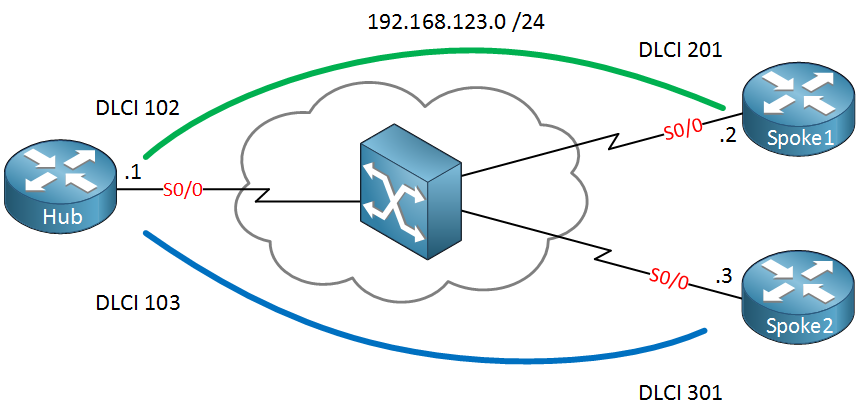In previous lessons, I explained the OSPF non-broadcast and broadcast network types. Now we are going to look at the OSPF point-to-multipoint network type. This is the topology that we will use:

There are a couple of things that you need to be aware of:
- Automatic neighbor discovery, so there is no need to configure OSPF neighbors yourself.
- No DR/BDR election since OSPF sees the network as a collection of point-to-point links.
- Only a single IP subnet is used in the topology above.
- Make sure your frame-relay network is configured with the broadcast keyword.
Let’s take a look at the configuration:
Hub(config)#interface serial 0/0
Hub(config-if)#ip address 192.168.123.1 255.255.255.0
Hub(config-if)#encapsulation frame-relay
Hub(config-if)#ip ospf network point-to-multipoint
Hub(config-if)#exit
Hub(config)#router ospf 1
Hub(config-router)#network 192.168.123.0 0.0.0.255 area 0This is the hub configuration. I changed the network type to point-to-multipoint and advertised the 192.168.123.0 /24 network in OSPF. Let’s look at the spoke router configuration:



Hey,
Since we are using a frame relay network and I see that you have not included a broadcast command with the the frame relay command, how do the OSPF neighbors identify each other? As mentioned before without the broadcast command no multicast traffic will pass. Is this behavior because of point to point topology? How will the Hub/Spoke know that it has an OSPF speaking router on the other end, if no multicast traffic is flowing?
Hello Apoorva
RFC 2328 indicates what kind of hello and LSA communication OSPF uses for each type of network. These are summarized below:
This means that the Point to Multipoint communication between OSPF routers is unicast.
Now having said that, when you configure the frame relay maps in your configuration, you will require the broadcast keyword. The frame relay maps are not actually shown in the
... Continue reading in our forumsir can you explain me ?
1> what is point to point ( as my understanding point to point link is serial links ) and also i want to ask one thing how they can do multicast because you have told me in another question which i have asked with you that ethernet link has a multiaccess technology so they can do multicast please explaint it
2> what is point to multipoint link please explain with example i am very confused on it
Hello Harshit
When we speak about point to point and point to multipoint we are primarily talking about the different types of topologies that exist using Frame Relay.
Strictly speaking, a point to point connection is one that is created between two routers using a serial technology, as you correctly state. Frame Relay is such a technology. Now if you connect two routers together using Frame Relay this is a point to point connection. However, you can also create two point to point connections over Frame Relay, where you have a single Hub router connected to
... Continue reading in our forumsir
I want to ask when we are using point to point connection we have to create a subinterface in hub router because we have a single link but why we create a subinterface in spoke routers why not we directly use it without subinterface